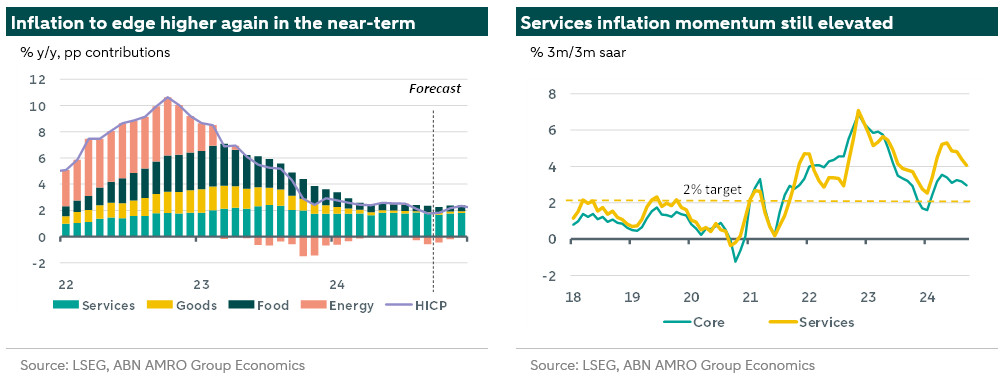September inflation fall seals October ECB cut

Headline inflation in the eurozone fell sharply to 1.8% y/y, down from 2.2% in August. Core inflation edged only slightly lower to 2.7% from 2.8% in August.
Inflation falls sharply, but services still elevated
The declines were in line with consensus, but we had expected a somewhat bigger fall to 1.7% in headline inflation and to 2.6% in core. As expected, the main driver was energy, largely driven by the c3.5% m/m drop in petrol prices, and reflecting the recent declines in oil prices. The main driver of the upside surprise compared to our forecast came from services and food. Services inflation edged down to 4.0% from 4.1% in August, but this mostly due to the unwind of the Paris Olympics impact in French services inflation, with services inflation elsewhere holding at stubbornly high levels. Food inflation picked up on a monthly basis to 0.4% m/m sa, up from 0.3% in August, with y/y food inflation picking up slightly to 2.4% from 2.3%. On the plus side, goods inflation remained weak - on the ECB’s seasonally adjusted m/m measure goods prices were again stagnant in September, with y/y goods inflation holding steady at just 0.4%. Looking ahead, inflation is likely to edge higher again in the near-term, peaking at 2.3% in December, as base effects in energy become less favourable, while services inflation is expected to remain elevated. However, this is likely to prove short-lived, with the weaker economic backdrop making it harder for businesses to pass on higher wage costs to consumers, while wage growth itself is likely to normalise as the labour market softens.

Inflation decline seals October cut
Given the economic weakness evident in the September PMIs last week, today’s datapoint was the last remaining potential obstacle to the ECB forging ahead with another rate cut on 17 October. Indeed, financial markets now price in a 90% chance of another 25bp cut, up from 80% at the end of last week. We expect the Governing Council to cut by 25bp at every coming meeting until the deposit rate reaches 1.5% next September. See our for more on the . (Bill Diviney)
Dutch inflation remains a services story
September inflation (CPI) came in at 3.5% y/y, down from 3.6% in August, and a bit higher than our and consensus expectations (3.3% y/y). Compared to the same month last year, industrial prices increased by 0.4%. Similarly, food (6.0%) and services (5.6%) prices increased, whereas energy prices sharply declined (-6.1%) mostly on the back of lower petrol prices. Generally, inflation is gradually falling further but services continues to exert upward pressure, driven by higher housing rent indexation in July and still elevated wage growth. Food prices recently rose somewhat again due to the excise duty hike on tobacco implemented from 1 April 2024. This adjustment has a delayed effect, as initially tobacco stocks may be sold with old excise rates. Industrial goods prices are expected to be a negative contributor for the rest of the year given the weaker demand we see in the broader eurozone. All in all, inflation is expected to fall further, to 3.2% this year and 2.9% next year; still above the ECB's 2% target. (Aggie van Huisseling)

